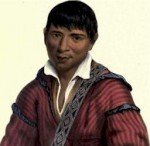
The name of this individual indicates his lineage. His father was an Irishman, who married a Creek woman, and handed down to his son a name which, though neither euphonious nor dignified in our ears, is perpetuated with no little pride by the son of Erin. The young Paddy was born near Fort Mitchell, in Alabama, and, in his infancy, was taken into the family of Colonel Crowell, the Indian agent, and kindly reared in the habits of civilized life. He was very intelligent, acquiring with facility the language of his benefactors, yet retaining his own, so as to be able, in after years, to speak both with equal fluency. In 1826, he accompanied the delegation headed by Opothle Yoholo, to Washington city, in the capacity of interpreter; and, although but nineteen years of age, he evinced a quick perception of the human character, which enabled him to manage and control the Indians with more success than many who were his seniors. His intuitive sagacity was such that, in rapidly interpreting the speeches of the Indian orators, even under the embarrassment of a public audience, while he faithfully repeated the thought expressed by the speaker, he often gave it additional vigor and clearness, by the propriety and force of the language in which he clothed it. As the substance of the harangues made on such occasions, by aboriginal diplomatists, is usually matured by previous consultation, he was probably well advised of the whole ground that would be taken; but those who, know how much ability is employed in making an accurate and spirited translation, will acknowledge the merit of filling well so difficult, an office as that of interpreter. He possessed the entire confidence of the whole delegation, who regarded him as a youth of superior talents.
Soon after his return from Washington, he married the daughter of Colonel Lovett, a respectable half breed, with whom he received a portion, which, with the property accumulated by himself, furnished a capital sufficient to enable him to go into trade. In a few years he amassed considerable property, and, in 1837, was possessed of from seventy to eighty slaves, besides landed property, and a large stock of horses and cattle.
In 1836, he was drawn from the quiet pursuits of trade and agriculture, by the hostile attitude of a portion of the Creeks, and, unwilling to remain inactive, he promptly took the side of the government. When Major-General Jessup, with an escort of about a hundred horsemen, attempted to pass through a part of the revolted district, for the purpose of joining and taking command of the Alabama forces, Paddy Carr attended him as guide and interpreter. In a part of the country where much of the land was low and swampy, and where the roads were rendered passable by causeways made of logs, these latter were found torn up, and several straggling Indians were seen. Supposing these to be the scouts of a large body, Paddy Carr expressed his conviction that an army of eight hundred warriors was at hand, and suggested that no time should be lost in getting through these passes. The advice was taken, and, by pushing boldly through, the danger was avoided. In conducting the escort back, a circuitous route was taken, by which the same body of Indians was again eluded, and a party of gallant volunteers were saved from the fatal catastrophe which befell the lamented Dade and his unfortunate companions. This happy result has been attributed, and we suppose with some reason, to the sagacity of Paddy Carr, who was the successful guide.
He continued in the service as a guide and interpreter, and also as a leader of the Indian warriors, during the continuance of the troubles in the Creek nation, and was a general favorite with the army.
The Creek revolt being over, Paddy Carr marched to Florida as second in command of about five hundred Creek warriors, who volunteered their services to the government: We understand that he ranks deservedly high, as well for his courage and skill as for his acceptable deportment in the social circle.
Paddy Carr has an innate passion for fine horses, and owns a large number of very valuable animals. He is fond of racing, and, when he has a trial of speed depending, if he cannot suit himself with a rider, he rides his own horse. He is of a liberal and generous disposition, hospitable to strangers, and kind to the poor. Many of the poorer classes of Indians depend on him for support. He has three wives, one of whom is daughter of the ill-fated General McIntosh. The two first born of his children were twin girls, and Captain Crowell, the son of his early friend and patron, having a daughter named Ariadne, he called one of his twins Ari and the other Adne, thus evincing a sense of benefits received, which is in itself one of the highest evidences of a noble mind.
